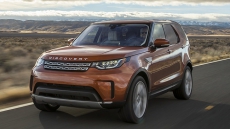The Hatch Gets Hotter
It’s a carry-over year for the GTI, now in its seventh generation, but that doesn’t mean Volkswagen was content to just do nothing to the iconic zippy hatchback. The folks at Wolfsburg have tuned the powerplant, borrowed some performance upgrades from the track-ready Golf R, and DARPAN got a chance to try it all out. Here’s what we found.
There isn’t much in the styling department to report in terms of changes, and that’s fine because the current platform still looks fresh. We drove the top-of-the-line Autobahn trim that gets standard LED daytime running lights curving up and around the outer edges of the adaptive headlamps. The housings themselves contain decorative red accents that join a matching red strip installed at the base of the slightly reworked mesh grille. The front bumper is a bit sportier than previous, integrating a subtle front splitter.
One great thing that VW does is pay homage to the badge’s heritage. The GTI is a vehicle with as contemporary an appearance as any other new 2018 example, but enthusiasts will instantly recognize the classically-shaped roofline, C-pillar and side window design. Inside, the “Clark” plaid upholstery harkens back to the model’s humble Mk1 roots.
The GTI cabin has always been a pleasant place to sit, and it remains so with classy touches like the real aluminum trim, red-stitched leather bits and minimalist layout. The sport seats are comfy and supportive, and are a little quirky having a powered recline function but manual front/rear adjustments. As is the case in most hatches, interior room is plentiful, thanks to the boxy shape and 60:40 split rear seats. When the backrest is folded, there is nearly 1,500 litres of cargo space.
Our press loaner utilizes the MIB II infotainment system that is much improved over the outgoing version. Inputs made on the eight-inch touchscreen were quick and responsive, and the sound clear and loud coming out of the Fender stereo.
As mentioned above, the motor remains a 2.0-litre TSI turbocharged unit that engineers have managed to squeeze in an extra 10 horsepower, for a total of 220 horsepower (using premium octane fuel) and 258 lb-ft of torque. Both a six-speed manual (complete with golf ball shift knob!) or a six-speed DSG automatic are available, the latter being the one we tested. I’m a manual man through-and-through, but Volkswagen’s refined dual-clutch gearboxes almost make me want to consider joining the other side.
Our Autobahn grade car also receives bigger vented brake discs all-around, 13.4-inch front and 12.2-inch rear, same as the ones on the R. The GTI’s sport suspension puts the overall height
15 millimetres lower than the normal Golf, and combined with the electronic XDS Cross Differential System provides excellent traction and grip over most surfaces. The trade-off is that occupants will most certainly feel more bumps in the road due to the stiffer springs. However, there is a DCC adaptive damping onboard and users may select, in addition to Normal, Sport and Individual modes, a Comfort setting softening up the road quality somewhat.
Consumers can choose to bundle a number of driver assistance safety options, like forward collision mitigation, radar cruise control, blind spot warning, and more. Autobahns include Park Pilot, an autonomous parallel and perpendicular parking assistant. New for this year is Manoeuvre Braking: sensors detect whether a potential collision is about to take place while in reverse, travelling between approximately 2 and 10 kilometres an hour, and if so, applies the brakes.
HIGHLIGHTS
MSRP: $39,045
Motor: 2.0-litre turbocharged four cylinder
Horsepower: 220 @ 4,700 rpm
Torque (lb-ft): 258 @ 1,500 rpm
Gearbox: Six-speed dual-clutch automatic
Layout: Front engine,
front-wheel drive
Fuel economy: 7.9 L/100 km mixed city/highway (observed)




